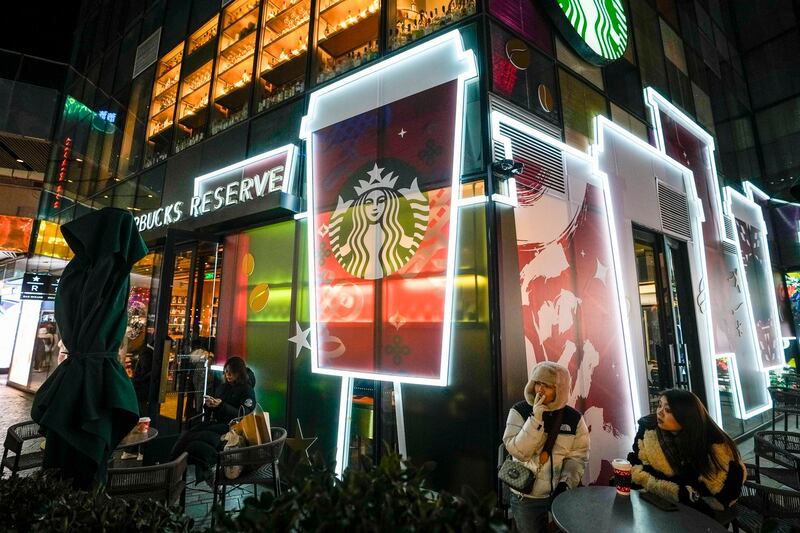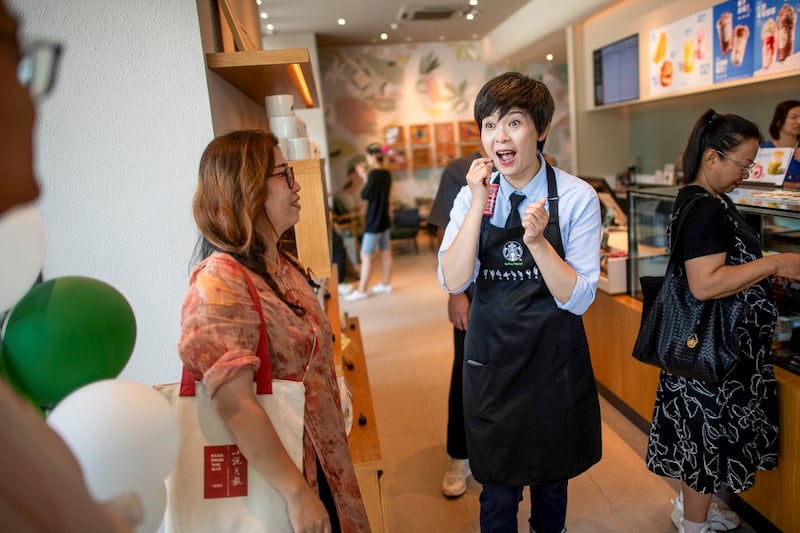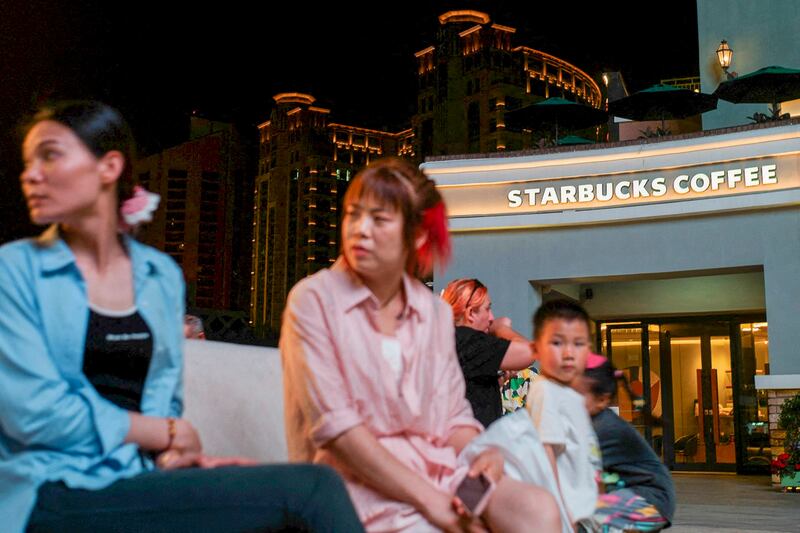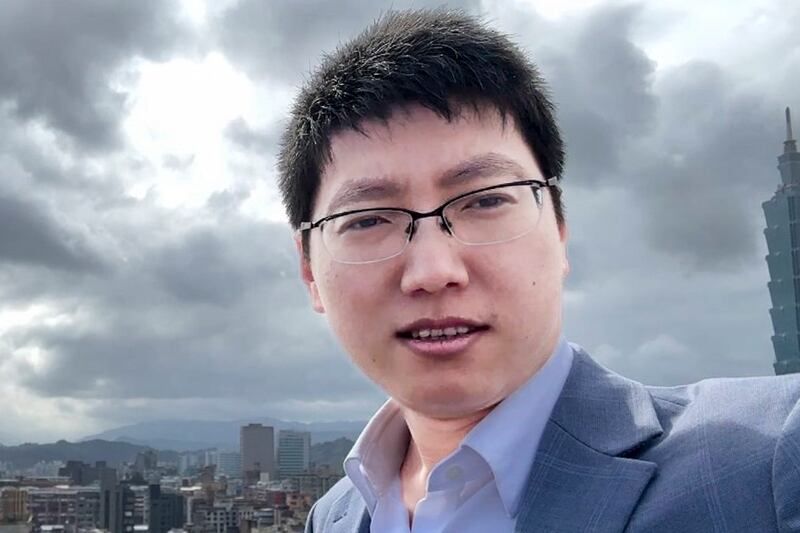Coffee giant Starbucks has reported a sharp fall in China sales, as consumer spending among the country's middle classes remains sluggish despite government attempts to kick-start the post-lockdown economy.
The global chain's revenue fell by 1% from April-June on the back of weakening footfall in China and the United States, CEO Laxman Narasimhan told investors on Tuesday, in comments reported by the Associated Press.
Same-store sales plummeted by 14% in China, where Starbucks' second-largest market is under pressure from lower-priced rivals, Narasimhan said. Same-store sales refers to stores that have been open for longer than a year.
The figures from the 6,500 Starbucks stores across China come amid a flagging economy and weak domestic consumption. Starbucks said Chinese customers are making fewer trips to the company's stores, and spending less with each visit.
“We are focused on what we can control in a consumer environment that can best be described as ‘complex,’” Narasimhan said in a conference call, adding that many consumers around the world are cautious about their spending and are more likely to stay home.

Starbucks' performance in China has been a hot topic among Chinese financial bloggers since the figures were announced, with some linking it to dwindling purchasing power among the country's middle classes.
"Once upon a time, drinking coffee at Starbucks was kind of a bourgeois mood," blogger Lao Shuai CFA wrote. "But competition has intensified in recent years."
He said most Chinese coffee-drinkers are reluctant to pay more than 10 yuan for a cup of coffee.
"The price of a single cup of Starbucks coffee gets you three cups at Luckin Coffee," the blogger wrote in a reference to a homegrown cut-price coffee chain. "So everyone's going to pick quality coffee produced domestically."
Low spending power
Economist Si Ling said that China's coffee-drinking culture was largely driven by the influx of foreign capital to the financial and high-tech sectors, with a target demographic of well-heeled urbanites in Beijing, Shanghai and Guangzhou.
He said that Starbucks' unsatisfactory figures highlight the lack of spending power among the middle class, and even shrinking of the higher-income classes, due to the exodus of foreign capital.
"The coffee sector was once seen by economists as a bellwether for the development of high-tech industries in China," Si said. "The higher [its sales], the faster the growth of high-tech and modern service industries."
"But the sector has lost its sheen, and indicates that employers in top-tier consumer cities like Beijing, Shanghai, Guangzhou and Shenzhen are rapidly laying off employees," he said. "That also shows that the Chinese economy is continuing to shrink, and that foreign capital continues to leave China."

Narasimhan said Starbucks is in the early stages of exploring a strategic partnership or joint venture in China that could help it expand, while cushioning its exposure to an uncertain economy.
“What we want to be sure of is that we are further strengthening our advantage in this market because the long-term opportunity for us is significant,” he said.
Online writer Gongzi Shen said the ruling Chinese Communist Party's insistence on restructuring the economy to be less export-led and less dependent on foreign technologies had made the country less attractive to foreign investors.
"China's emerging tech sector is finding it hard to expand globally, or to update their technology due to export bans and sanctions," he said. "The Chinese Communist Party also says it wants to strengthen and expand the state sector."
"Its pursuit of political stability has resulted in fewer resources for the private sector," he said. "That ... has led to a downward shift in consumption, as people try to reduce unnecessary expenditure as much as they can."
That is especially true of younger people, according to former Starbucks customers in mainland China.
Take a moment to read more
[ Glitzy Shanghai mall closes, leaving US visa office sole occupantOpens in new window ]
[ China's third plenum offers little in the way of economic helpOpens in new window ]
[ Chinese officials tour foreign-invested firms in bid to stem exodusOpens in new window ]
A luxury now
A Chinese woman studying overseas who gave only the nickname Emily for fear of reprisals said being a Starbucks customer used to mean that a young person had successfully joined the white-collar middle class.
"I think Starbucks used to represent membership of the middle class," she said. "If you could go to Starbucks, you would feel like you had a high-level job. But I don't think the association is that strong now."
She said government-backed campaigns to consume more Chinese-made products were also having an effect, while competition is intense in affluent urban areas.
"Especially in Shanghai and Beijing, there are so many more choices than Starbucks," Emily said. "With that kind of competition ... who would pay several times the price?"

Another overseas student who gave only the surname Ye for fear of reprisals said he used to go to Starbucks with his friends, but now a lot of people in his age group are struggling to find work, and can't afford to go out for tea or coffees all the time.
"Given the income levels in mainland China, Starbucks in particular is a luxury for a lot of people," Ye said. "Also, young people love to drink milk tea, so if they have any spare cash, they'll go somewhere like Mixue Bingcheng, where it only costs three, four or five yuan a cup."
He added: "Not a lot of my classmates have salaries, and even internships are hard to come by these days. I used to go to Starbucks sometimes, or get a cup of Mixue Bingcheng at the internet cafe late in the evening, but now I can't afford these things."

Translated by Luisetta Mudie.
